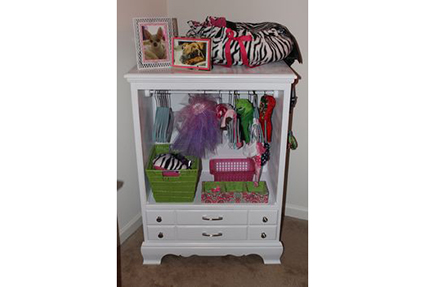Purging Your Pet’s Closet

Purging Your Pet’s Closet
A common recurrent theme in magazines like Real Simple, Good Housekeeping, and Glamour is closet organization. These publications recommend purging closets seasonally to prevent accumulation of unwanted clothing and accessories. Many of us with pets have a small cabinet or closet devoted to our pet’s belongings. Taking a cue from these glossies, I am going to give some tips for cleaning out your pet’s closet.
If He Won’t Wear it, Recycle it
When you get to the back of your pet’s closet and find that really ugly sweater from Aunt Sally your dog has never worn or his favorite raincoat from when he was a puppy, but it no longer fits, cut the cord and send these unused items to a textile recycling center. Ditto for worn leashes and collars which present a safety hazard for your pet. In New York City, greenmarkets collect unwanted clothing, shoes and other fabric items for recycling.
Rid the Closet of Expired Medications
I am quite confident that when you clear out the closet you will find expired pet medications. Why? Because many of my clients call asking if they can use a medication for their pet found in the back of the closet. First thing I ask them is to tell me the expiration date on the box and usually that medication expired many months prior. The expiration date of medications is printed on the pharmacy label or the box. If you have outdated medication, use the United States Food and Drug Administration (FDA) guidelines to dispose of the drugs properly.
Toss the Expired Food
Before you replace any dog or cat food in the closet, check the expiration date on the bag or can and if outdated, dispose of it. Opened bags of dry food that have not been sealed tightly are likely to be stale or even rancid. Dispose of them as well.
No Need to Store Bones
Board certified veterinary dentists at the Animal Medical Center caution all dog owners against using natural bones or synthetic bones made of nylon as dog chew toys. Both types of bone are the cause of tooth fractures. When a tooth fractures and exposes the pulp cavity, either extraction or a costly restoration is needed. Avoid an emergency trip to the veterinary dentist by choosing tooth-friendly toys such as those made of hard rubber or fabric.
What? You Still Have Jerky Treats?
Between 2007 and December 31, 2015, the FDA has received approximately 5,200 complaints of illnesses associated with consumption of chicken, duck, or sweet potato jerky treats from pet owners. The cause of these illnesses is unknown. Since jerky treats are not a required part of your pet’s diet, veterinarians recommend selecting other types of treats for your pet. If you are feeding jerky treats and your pet becomes ill, tell your veterinarian about the jerky treat ingestion. If you believe your pet has become ill from consuming a jerky treat, please provide the FDA with valuable information by reporting it electronically through their Safety Reporting Portal or your local FDA Consumer Complaint Coordinator.
Once you have that closet cleaned, spend some quality time with your pet and play with all the fun toys you re-discovered while cleaning out your pet’s closet.

































